Table of Contents
The Directorate of Educational Research and Training, Meghalaya (DERTM) has officially released the Meghalaya Teacher Eligibility Test (MTET) 2025 notification, with the exam scheduled for 25th April 2025. Both Paper I and Paper II will be held on the same day, separated by a 90-minute break. Aspirants preparing for this crucial state-level teaching eligibility exam must thoroughly review the Meghalaya TET Syllabus 2025 to gain a comprehensive understanding of the subject-wise topics. A well-structured preparation strategy based on the detailed syllabus can significantly boost candidates’ chances of success. This article offers the complete MTET syllabus 2025 in a user-friendly, easy-to-access format to support effective and focused exam preparation.
Meghalaya TET Syllabus 2025
As the Meghalaya TET exam date approaches, it is essential for candidates to thoroughly review the official Meghalaya TET syllabus for both Paper I and Paper II. This state-level eligibility test, conducted to certify candidates for recruitment as Elementary School Teachers in government schools across Meghalaya, covers a comprehensive range of topics. Paper I includes five key subjects, while Paper II focuses on four core areas. Understanding the detailed syllabus allows aspirants to identify important topics, streamline their preparation, and focus on areas that carry more weight. A strategic, syllabus-based study plan will significantly enhance candidates’ chances of qualifying for the exam.
Meghalaya TET 2025 and Exam Pattern
Before appearing for the Meghalaya TET 2025 exam, candidates must thoroughly understand the MTET Exam Pattern 2025 to enhance their preparation strategy. The Meghalaya TET Paper-I comprises 150 multiple-choice questions (MCQs), each carrying one mark, totaling 150 marks. Conducted in offline mode (pen and paper-based), the exam duration is 150 minutes (2.5 hours), and there is no negative marking for incorrect answers. A clear grasp of the exam pattern enables candidates to plan their time effectively, prioritize high-weightage sections, and boost their confidence on exam day. Refer to the detailed Meghalaya TET Paper-I exam pattern below for better clarity and structured preparation.
Meghalaya TET Paper I (for Classes I to V) Primary Stage
| S.No. | Subjects |
No. of Questions
|
Marks
|
|---|---|---|---|
|
1
|
Child Development and Pedagogy
|
30
|
30
|
|
2
|
Language I (compulsory)-Khasi/Garo/Assamese/Bengali/Hindi/Nepali
|
30
|
30
|
|
3
|
Language II (compulsory) – English
|
30
|
30
|
|
4
|
Mathematics
|
30
|
30
|
|
5
|
Environmental Studies
|
30
|
30
|
|
Total
|
150
|
150
|
Meghalaya TET Paper-II (for Classes VI to VIII) Elementary Stage
| S. No. | Subjects |
No. of Questions
|
Marks
|
|---|---|---|---|
|
1
|
Child Development and Pedagogy
|
30
|
30
|
|
2
|
Language I (compulsory)-Khasi/Garo/Assamese/Bengali/Hindi/Nepali
|
30
|
30
|
|
3
|
Language II (compulsory)- English
|
30
|
30
|
| 4 |
Mathematics & Science Or Social Studies/Social Science
|
60
|
60
|
|
Total
|
150
|
150
|
Meghalaya TET Syllabus 2025 For Paper 1
The Meghalaya TET Syllabus 2025 for Paper 1 is designed for candidates aspiring to teach Classes I to V, focusing on foundational knowledge and pedagogical competence. The Child Development and Pedagogy section covers stages of child development, cognitive and moral growth, gender issues, inclusive education, and assessment techniques, along with practical teaching strategies and child study methods. Language I (Hindi) evaluates reading comprehension, grammar, and vocabulary through poetry, prose, and language activities. Language II (English) assesses listening, speaking, reading, writing skills, and the ability to analyse classroom language situations, with a focus on assessment and unseen passages.
The Mathematics section includes number systems, fractions, geometry, measurement, patterns, and data handling, emphasizing conceptual understanding, child-friendly teaching methods, and assessment. The Environmental Science (EVS) section explores natural resources, biodiversity, food, public properties, and the unique features of Meghalaya, integrating observation-based, activity-driven approaches and local learning resources. Overall, the syllabus aims to test a teacher’s ability to deliver meaningful, inclusive, and engaging education at the primary level.
Meghalaya TET Paper 1 Syllabus for Child Development and Pedagogy
| Topic | Details |
| Understanding Child Development | Concept and nature of development, Stages of development (Infancy to childhood), Factors affecting child development in socio-cultural contexts |
| Aspects of Child Development | Physical and motor development, Cognitive development (Piaget’s stages), Social and emotional development, Moral development (Kohlberg’s theory), Language and communication development |
| Gender Development | Concept of gender and sex, Gender socialization during childhood, Issues of gender inequality (Gender bias and inequities in educational practices), Role of the teacher in promoting gender equality and sensitivity |
| Methods of Child Study | Methods: Naturalistic observation, participant observation, Case study, anecdotal records, Reflective journals, student portfolios, Questionnaires, unstructured interviews |
| Inclusive Education and CWSN | Concepts and meaning of inclusive education, Difference between integrated and inclusive education, Understanding disabilities and challenges faced by learners, Understanding exceptional learners (Gifted, talented, creative, slow learners, and underachievers), Role of the teacher in creating inclusive classrooms and supporting CWSN |
| Learning and Pedagogy | Concept of teaching and learning, Factors affecting learning, Basic learning styles (Audio, visual, tactile/kinesthetic), How children learn (Observation, inquiry, and exploration), Teaching skills and classroom activities, Steps in lesson planning (Pre-teaching, transaction of lessons, post-teaching), Approaches to teaching (Teacher-centred, learner-centred, constructivist approaches), School internship experiences and reflective practices |
| Assessment of Students’ Performance | Assessment for, as and of learning, Types of assessment (Formative, summative, diagnostic), School-Based Assessment (SBA) – Characteristics, features, and importance, Techniques and tools of SBA (Activity-based assessments, observation, rubrics, achievement tests) |
Meghalaya TET Paper 1 Syllabus for Language I – Hindi
| Topic | Details |
| Unit I: PADYA (POETRY) | Prakriti ka Sandesh, Ham Anek, Kintu EK, Kadamb ka Ped, Meri Abhilasha Hai |
| Unit II: GADYA (PROSE) | Hamare Ped Paudhe, Imandari Shrestha Niti, Do Bailon ki Katha, Kaki |
| Unit III: Vyakaran Aur Rachana | Bhasha Kaushal Vikas, Varna: Swar, Vyanjan aur Matrayen, Sangya, Ling, Vachan, Vilom Shabda, Anek Shabdon ke liye EK shabda |
Meghalaya TET Paper 1 Syllabus for Language II – English
| Topic | Details |
| Oral Language Development |
|
| Reading Skills |
|
| Writing Skills |
|
| Understanding Classroom Situations |
|
| Assessment Techniques |
|
| Language Comprehension |
|
Meghalaya TET Paper 1 Syllabus for Mathematics
| Topic | Details |
| Nature of Mathematics |
|
| Pedagogical Approaches |
|
| Assessment and Evaluation |
|
| Number Systems |
|
| Fractions and Decimals |
|
| Percentage |
|
| Measurement |
|
| Geometry and Spatial Understanding |
|
| Patterns and Logic |
|
| Data Handling |
|
Meghalaya TET Paper 1 Syllabus for Environmental Science (EVS)
| Topic | Details |
| Introduction to EVS |
|
| Learning Objectives |
|
| Approaches to Teaching-Learning EVS |
|
| Assessment in EVS |
|
| Learning-Teaching Resources |
|
| Content Areas |
|
| Environmental Conservation |
|
Meghalaya TET Paper 2 Syllabus
The Meghalaya TET Paper 2 Syllabus is structured to assess the competence of candidates aspiring to teach at the upper primary level (Classes VI to VIII). It includes Child Development and Pedagogy, focusing on the principles of child growth, development stages, gender issues, inclusive education, and effective learning strategies grounded in Piaget’s and Vygotsky’s theories. It also evaluates assessment methods such as formative and summative techniques. Language I (Hindi) and Language II (English) test comprehension, grammar, writing skills, and pedagogical understanding with a blend of poetry, prose, grammar, and functional language use.
The Mathematics section covers foundational concepts, number systems, algebra, geometry, statistics, and pedagogical strategies including assessment and ICT integration. Science includes topics such as motion, heat, light, states of matter, cells, and biological processes, along with an emphasis on inquiry-based and experiential teaching methods. Overall, the syllabus aims to evaluate subject knowledge, pedagogical understanding, and the ability to foster inclusive and effective learning environments.
Meghalaya TET Paper II Syllabus for Child Development and Pedagogy
| Topic | Details |
| Understanding Child Development | Meaning and concept of growth and development. |
| Developmental characteristics of childhood and adolescence. | |
| Development of children in socio-cultural contexts and its relationship to learning. | |
| Factors influencing development. | |
| Aspects of Development | Physical and motor development. |
| Cognitive development (Piaget’s theory of cognitive development). | |
| Socio-emotional development. | |
| Moral development (Kohlberg’s theory of moral development). | |
| Gender Development | Difference between gender and sex. |
| Stages of gender development. | |
| Stereotypes in gender development. | |
| Gender bias and its influence on educational practices. | |
| Gender identity within families and in matrilineal societies. | |
| Methods of Child Study | Cross-sectional, longitudinal and case studies. |
| Naturalistic and participant observation. | |
| Reflective journals and student portfolios. | |
| Anecdotal records, interviews and narratives. | |
| Piaget’s clinical method of child study. | |
| Inclusive Education and Children with Special Needs (CWSN) | Concepts and meaning of inclusive education. |
| Difference between integrated and inclusive education. | |
| Understanding disabilities and types of disabilities. | |
| Barriers and challenges to inclusive education. | |
| Learning and Pedagogy | Concept of learning and factors affecting learning. |
| Information processing approaches: Working memory, long-term memory, attention, encoding and retrieval. | |
| Piaget’s constructivism: Relationship between learning and development. | |
| Vygotsky’s constructivism: Scaffolding and the Zone of Proximal Development (ZPD). | |
| Teacher-centred vs. learner-centred approaches to teaching. | |
| Teaching skills and activities for active learning. | |
| Steps in lesson preparation: Pre-teaching, teaching transactions, post-teaching (including lesson planning). | |
| Use of learning resources and teaching-learning materials (TLMs). | |
| Assessment of Students’ Performance | Concepts of assessment: Assessment for learning, assessment as learning and assessment of learning. |
| School-Based Assessment (SBA): Purpose, features and techniques. | |
| Formative and summative assessment methods. | |
| Tools and techniques for assessment: Activity-based assessments, observation, rubrics and achievement tests. | |
| Blueprint design and types of questions. | |
| Diagnosis of learning difficulties and strategies for remedial teaching. |
Meghalaya TET Paper 2 Syllabus for Language I – Hindi
| Topic | Details |
| Unit I: PADYA | Pushpa Ki Abhilasha, Christmas ka Bara Din, Basanti Hawa, Krishna Ki Chetavani |
| Unit II: GADYA | Namak Ka Daroga, Galta Loha, Bharatmata, Adarsh Mahila-Sita |
| Unit III: Vyakaran Aur Rachana | Bhasha Kaushal Vikas, Sarvanam, Visheshan, Kriya, Sandhi, Paryayavachi Shabda, Vilom Shabda, Muhavare Aur Lokoktiyan |
Meghalaya TET Paper 2 Syllabus for LANGUAGE II – English
| Topic | Details |
| Functional Aspects of Language | What is language? Purpose and meaningful use of language. |
| Social context of language: Influence of mother tongue, multilingual classrooms and the status of English in India. | |
| Oral Language Development | Strategies for oral language development: Activities for developing extempore speech. |
| Communicative competence in children: Roleplay, recitation, storytelling, debates, extempore speech, etc. | |
| Developmental stages of reading and writing. | |
| Reading Skills | Types of reading: Reading across the curriculum (content-based and narrative texts). |
| Role of schema in reading comprehension. | |
| Reading beyond textbooks: Encouraging critical engagement with diverse texts. | |
| Writing Skills | Writing as a process and purpose-driven activity: Emphasis on audience, purpose and process over product. |
| Connecting reading and writing to reinforce comprehension and creativity. | |
| Assessment in Language Learning | Process-oriented assessment in constructivist classrooms: Evaluating content over form and structure. |
| Use of portfolios and reflective journals for ongoing evaluation. | |
| Reflective Practices | Writing reports, maintaining student profiles and analysing classroom challenges. |
| Language Comprehension and Grammar | Reading unseen passages (prose/poetry) for comprehension and inference. |
| Composition and grammar: Application of grammatical rules in writing and speaking. |
Meghalaya TET Paper 2 Syllabus for Mathematics
| Topic | Details |
| Foundations of Mathematics | Building blocks of mathematics: Definitions, axioms, conjectures, proofs and counterexamples. |
| Place of Mathematics in the school curriculum. | |
| Mathematics outside the classroom: Relating mathematical concepts to daily life. | |
| Teaching Methods in Mathematics | Methods of teaching mathematics: Inductive-Deductive, Analysis-Synthesis, Problem-solving, Project-based learning and Discovery methods. |
| ICT tools and resources: Learning apps, software and interactive tools for teaching mathematics. | |
| Community Mathematics: Using local resources and collaborative programs to enhance learning. | |
| Assessment and Evaluation | Assessment techniques: Formative and summative assessments and tools for evaluating mathematical understanding and application. |
| Number Systems | Natural numbers, whole numbers, integers and rational numbers. |
| Prime and composite numbers, divisibility, factors and multiples. | |
| Finding LCM and HCF and their applications in real-life problem-solving. | |
| Ratio and Proportion | Concepts of ratio and proportion and their applications. |
| Algebra | Introduction to algebra: Variables, coefficients and constants. |
| Linear equations and algebraic identities e.g., (a ± b)², (a² – b²) and their applications. | |
| Geometry | Lines, angles, triangles and their properties. |
| Symmetry: Reflection, line of symmetry and symmetrical figures. | |
| Area and perimeter of triangles, rectangles, parallelograms and circles, including applications. | |
| Statistics and Data Handling | Measures of central tendency: Mean, median and mode. |
| Bar graphs: Reading, interpreting and representing data graphically. |
Meghalaya TET Paper 2 Syllabus for Science
| Topic | Details |
| Nature of Science | Scientific knowledge and inquiry., Scientific methods and attitudes. |
| Learning Objectives | Aims and objectives of teaching Science as outlined in NCF 2005. |
| Assessment | Types, purpose, tools and techniques of assessment in Science., Remedial teaching strategies. |
| Approaches to Teaching-Learning | Observation, experiment, hands-on activities and concept mapping., Application of inquiry-based and experiential learning methods. |
| Teaching-Learning Resources | Local resources, ICT, textbooks, laboratories, films and field trips., Organization of science exhibitions and use of visual aids. |
| Science Content Areas | Motion: Different views and principles of motion. Heat and Temperature: Concepts and applications. Light and Electricity: Understanding basic principles and their real-life implications. States of Matter: Properties and applications of solids, liquids and gases. Acids, Bases and Salts: Identification, properties and their applications. Water and Air: Properties and their importance in daily life. Plant and Animal Cells: Structure and functions. Biological Processes: Nutrition, respiration, locomotion and movement in plants and animals. |
Download Meghalaya TET Syllabus 2025
As you can see, this detailed article states the complete Meghalaya TET syllabus 2025 for the candidates preparing for the much-awaited Meghalaya TET exam 2025. For more details, candidates can reach out to this detailed Meghalaya TET syllabus PDFs for Paper I and Paper II separately:
| Meghalaya TET Syllabus 2025 | |
| Paper I Meghalaya TET Syllabus 2025 | Download PDF |
| Paper II Meghalaya TET Syllabus 2025 | Download PDF |

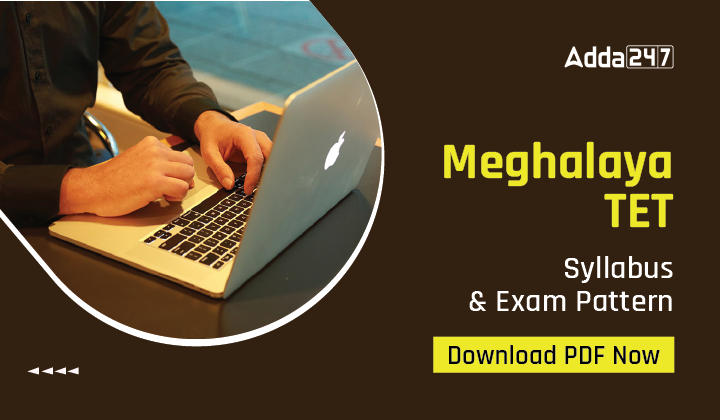
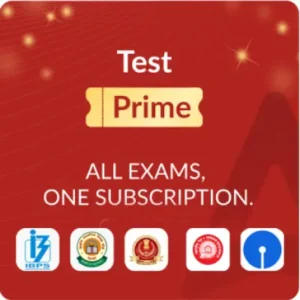

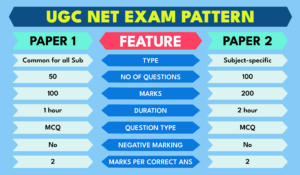 UGC NET Exam Pattern 2025 for Paper 1 an...
UGC NET Exam Pattern 2025 for Paper 1 an...
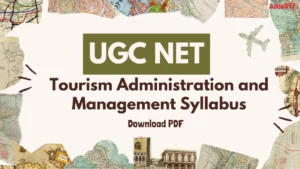 UGC NET Tourism Administration and Manag...
UGC NET Tourism Administration and Manag...
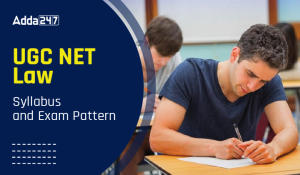 UGC NET Law Syllabus 2025 and Exam Patte...
UGC NET Law Syllabus 2025 and Exam Patte...














